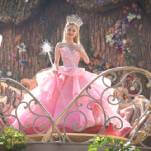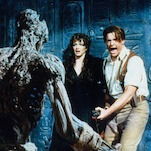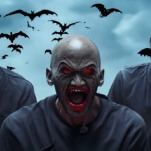For a brief moment as
World War II drew to a close, Bill Mauldin was the most famous cartoonist in
America. Only in his early 20s when he filed pen-and-ink dispatches for his
division's newspaper during the bloody, grueling Italian campaign in 1943,
Mauldin looked even younger; childhood health problems kept him short, skinny,
and jug-eared well into adulthood. The kid was accustomed to hustling every
cartooning job he could, perpetually fearful that he wouldn't be able to eke
out a living. Then fame hit overnight when Ernie Pyle devoted his famous
newspaper column to praising Mauldin's work for Stars And Stripes. Within a few weeks,
offers from syndicates, magazines, and publishers had overwhelmed the Army
paper, and General Patton was demanding that Mauldin's grim, pointed drawings
of enlisted men suffering indignities in camp and terror on the battlefield be
censored.
Todd DePastino's
extraordinary Mauldin biography, liberally illustrated with work from all
periods of Mauldin's career, captures a countermovement to the "Greatest
Generation" mythology that dominates current discussion of World War II.
Mauldin was under no illusions about the character or intrinsic heroism of the "dogfaces"
with whom he served and identified. They were, for the most part, victims of
processes beyond their control. One stunning 1944 cartoon reproduced in
DePastino's book depicts a soldier crawling out of his foxhole to defecate,
while bullets whiz by just overhead. "Wish to hell I wuzn't housebroke," he
remarks to the buddy he's leaving behind in the hole. Such routine, unromantic
humiliations of infantry life were Mauldin's contribution to truth-telling
about the war.
Mauldin made good use of
his instant celebrity after his discharge, penning scathing editorial cartoons
that condemned anti-Communist hysteria and Southern racial policies during the '50s
and '60s. He was an early champion of underground comics, he ran for Congress,
and he even tried his hand at acting. But his enduring legacy remains Willie
and Joe, the infantrymen he marched through Sicily and up to Germany in 1944
and 1945. In spite of the nostalgia industry's efforts to paint those cartoons
as feel-good relics of a time when soldiers were larger than life, the cartoons
and their story give eloquent testimony to Mauldin's burning moral sense.
DePastino translates their righteous anger into pithy memorials of a side of
the Good War that many would prefer to forget.








































